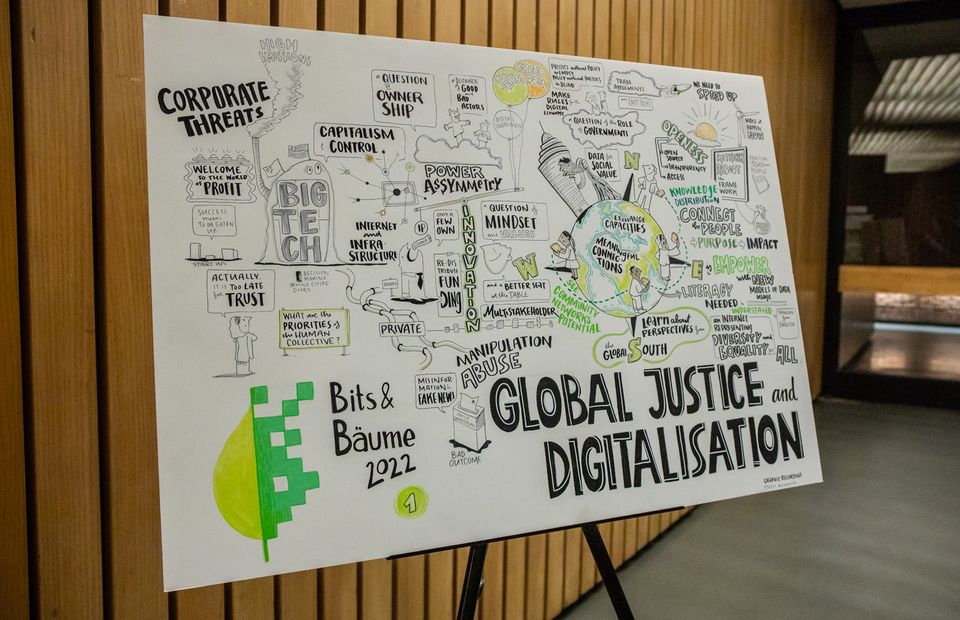Global Justice and Digitization
Digitisation increases power asymmetries on many levels. Perspectives from Latin America, Subsahara and India on structures of ownership and power.

Instead of empowering grassroot initiatives, digitalisation increases the power asymmetries on many levels. Three panelists with professional background and personal perspectives from latin america, the subsahara and india discussed the impacts of ongoing digitalisation within existing structures of ownership and power. What were the blind spots of the past and what are the key questions for the future?
Gabriel Karasan, founder of the Emerging Youth Initiative, Nandini Chami, Deputy Director of IT for Change and Renate Avilia, CEO of the Open Knowledge Foundation, were welcomed by Geraldine de Bastion at the Bits & Bäume Conference in Berlin (30.09-02.10.22) for a panel about "Global Justice and Digitalisation". The assesment of how power and ownership of digital and physical communication infrastructure is distributed and used, the three of them quickly poinedt out, that the whole chain, from cables to hardware and platforms and information, are in the hands of a few companies residenting in even less countries.
Empowering movements with Open Knowledge
Renate Avilia included an analyses of failures of the past: 20 years ago, when the "Open Knowledge Foundation" started, the agitation for openess of software and information did not happen with a strategic evaluation of the existing structures of power. Their aim would be to lead the benefits of openess to strengthen the existing asymmetrics of power. To adress this blind spots and the consequences, the "Open Knowledge Foundation" is focussing to fight secrecy, including the effects of patents, and connecting and empowering people and organizations around the globe by providing tools, technology and data.
Gabriel Karasan, identifying himself as a "Digital Dreamer", states that the "funds for digital social innovation are tiny" compared to the money that goes, for example, into "Fintech StartUps" especially in the Global South. It's this social innovation that Gabriel, beneath other things, is working for: changing the mindset of young people, overcoming the consumer driven perspective of digital infrastructuree and communicating digital literacies and Emerging Technologies.

Beyond binarities between big platforms and community driven projects
Nandini describes another development to change: The Internet was changed form a hyperlinked network to a platform centered environment. To adress this questions and issues of power and ownership, especially while facing the climate catasrophe and social and environmental consequences, Nandini points out the importance to overcome the binarity of either splitted digital spheres ("splinternets") or the embracement of global centric plattforms and advocate for the capabilities of linked, decentralized and federated information and infrastructure. This could transform into the usage of data without data extraction.
Gabriel states out, that the majority of young people living in the Global South - "the next billion" - need to be pioneers of a new global digitalisation. This could inspire a digitization that should be developed and put to use within the communities all over the world. According Gabriel, it is a key for people within the communities to "feel what it means to be meaningful connected" in order to overcome the perspective of a consumer of digital information and communication infrastructure. The transformation of this perspective is the first step to set conditions for the infrastructure of digitization, to set a legislative initiative and fight the existing structures of power.
Tactics to change the game
Renate Nandini and Gabriel pointed out, that scientific or technological innovations yet to come are not even near the center of the fight for global justice and digitization, but that existing power structures are using those innovations to self-enforce the current distribution of ownership and power. The localization and translation of existing technology and federated solutions are one of many possible tactics to embrace and empower people around the world and weaken existing ownership dsitributions and power structures.
Read also our Blog reports "Behind the Scenes" about "Self Organised Autonomous spaces", "We have to talk" on climate communication, about the opening panel "No Avocado Politics, please" and the invitation to some Conference Panels in English Language "Digital New World?".




